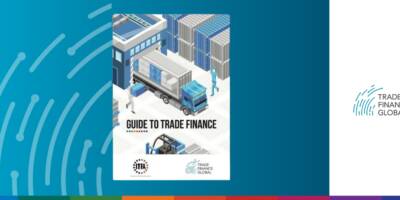Receivables Factoring | 2024 Trade Finance Global Guide
What is receivables factoring?
Receivables financing (or accounts receivable finance) is a finance arrangement in which a company uses finance flowing in (such as from overdue invoices) to go into an asset financing arrangement. The word ‘receivables’ is often spoken about in corporates or commodity trading houses, but simply put, it addresses finance flowing to a company – through debts owed or the outstanding invoices.
Receivables Factoring - Overview
In relation to receivables factoring or receivables finance in a company structure, a ‘receivable’ is usually the cash that would flow into the company, or it’s the debts owed.
These are known as future receivables; the total sum owed to that company company.
As an example, if there is a financing structure put in place for an oil cargo company, then the receivables are the sale of the underlying oil or commodity, i.e., the sale proceeds or cash in return for the product. The end customers who owe the money to the oil cargo company are traders or buyers.
Why is receivables factoring important?
Companies might want to access some form of receivables finance facility to service working capital or cash flow gaps. Often larger corporates or end customers delay payments and have long payment terms.
When a business sends out an invoice or is owed money, it may take many months for this to flow into the company due to the time provided to pay or ‘credit terms’. The credit terms provided may be due to the length of time being industry standard or the counterpart being very strong and so demanding long payment days. In the SME UK market, one may see this with large supermarkets who typically demand 90 or 120 day payment terms.
- Oil
- Metal
- Power
- Manufacturing
- Transport
- Textiles
- Machinery
- Technology
For a business to operate efficiently, cash flow is key. Thus, many companies will discount invoices or receivables when they are sent out.
Operationally this will look and feel a lot like invoice discounting or factoring. When an invoice is sent out, the funder will factor or discount the invoice and provide a percentage of the value owed in the invoice up front to the company. By discounting a portion of this ‘receivable’, the company is able to grow.
Invoice factoring or discounting is one type of receivables finance. There are others used within structured transactions. However, when it comes to receivables factoring, invoices are essentially the discounted product.
Receivables factoring is a term used interchangeably with invoice factoring. In effect, it is when the whole ledger of invoices or debts are factored. Receivables or invoice discounting will conversely mean that individual invoices are discounted and this may be selective invoices or customers of a company; not the whole book.
- Cash flow from the business or lending
- Invoice finance
- Invoice discounting
- Export factoring
- Structured finance
Companies looking for receivables factoring are generally seen and reviewed (in terms of eligibility) on a case by case basis. Generally, a financier would ask for the following in an application:
- Audited financial statements
- Full business plans
- Financial forecasts
- Credit reports
- Details and references of the directors
- Information on assets and liabilities
Receivables factoring can reduce working capital constraints. Many companies which have small overdraft facilities or are funded through venture capital or equity investment might want to free up cash to fund the day-to-day operations of the business, and given the uncertainty around receiving payments, receivables factoring can ease cash flow constraints and ensure guaranteed payment.
Featured Insights
 PODCAST | FCI’s Neal Harm on kicking off inclusive growth in the factoring industry – To better understand the principles of financial inclusion, equitable regulation, and sustainable growth in the factoring industry, Trade Finance Global’s (TFG) Deepesh Patel spoke with new FCI Secretary General, Neal Harm.
PODCAST | FCI’s Neal Harm on kicking off inclusive growth in the factoring industry – To better understand the principles of financial inclusion, equitable regulation, and sustainable growth in the factoring industry, Trade Finance Global’s (TFG) Deepesh Patel spoke with new FCI Secretary General, Neal Harm.  Football, factoring and fraud: Kicking out the bad actors, creating rules and standards – Factoring, invoice financing, and open account methods are vital for the global economy, aiding businesses in managing cash flow & liquidity.
Football, factoring and fraud: Kicking out the bad actors, creating rules and standards – Factoring, invoice financing, and open account methods are vital for the global economy, aiding businesses in managing cash flow & liquidity. The role of asset-backed securitisation: Can it bridge the financing gap for micro and SMEs? – In the world of finance for micro and small and medium-sized enterprises (SMEs), there’s a clear division between two crucial groups: Capital Deployers and Capital Providers. On one side, we have micro, small, and medium enterprises in emerging markets, brimming with potential due to growing local demand and export opportunities.
The role of asset-backed securitisation: Can it bridge the financing gap for micro and SMEs? – In the world of finance for micro and small and medium-sized enterprises (SMEs), there’s a clear division between two crucial groups: Capital Deployers and Capital Providers. On one side, we have micro, small, and medium enterprises in emerging markets, brimming with potential due to growing local demand and export opportunities.  VIDEO | From the boardroom: FCI reflections on receivables finance and factoring – In this video, Neal Harm, (incoming) Secretary General of FCI, sat down with Peter Mulroy, (outgoing) Secretary General of FCI and Daniela Bonzanini, (outgoing) FCI Chairwoman reflect on the organisation’s evolution, strategic initiatives, and the future of factoring.
VIDEO | From the boardroom: FCI reflections on receivables finance and factoring – In this video, Neal Harm, (incoming) Secretary General of FCI, sat down with Peter Mulroy, (outgoing) Secretary General of FCI and Daniela Bonzanini, (outgoing) FCI Chairwoman reflect on the organisation’s evolution, strategic initiatives, and the future of factoring. Video | UNIDROIT’s Model Law on Factoring and IFC’s Knowledge Guide in Marrakech – The FCI 55th Annual Meeting in Marrakech marked an important moment in receivables finance as the International Institute for the Unification of Private Law (UNIDROIT) launched the Model Law on Factoring.
Video | UNIDROIT’s Model Law on Factoring and IFC’s Knowledge Guide in Marrakech – The FCI 55th Annual Meeting in Marrakech marked an important moment in receivables finance as the International Institute for the Unification of Private Law (UNIDROIT) launched the Model Law on Factoring.  FCI scores hat-trick in Marrakesh: A giant leap for factoring – FCI, the global representative body for the factoring and receivables finance industry, has achieved a significant milestone by securing three major agreements during its annual meeting in Marrakesh.
FCI scores hat-trick in Marrakesh: A giant leap for factoring – FCI, the global representative body for the factoring and receivables finance industry, has achieved a significant milestone by securing three major agreements during its annual meeting in Marrakesh. Navigating the future of B2B commerce: A conversation with HSBC’s Vinay Mendonca – Vinay Mendonca, Chief Growth Officer, Global Trade and Receivables Finance at HSBC, sat down with Deepesh Patel at Sibos Toronto to discuss these shifts and how they are influencing trade finance.
Navigating the future of B2B commerce: A conversation with HSBC’s Vinay Mendonca – Vinay Mendonca, Chief Growth Officer, Global Trade and Receivables Finance at HSBC, sat down with Deepesh Patel at Sibos Toronto to discuss these shifts and how they are influencing trade finance. A common credit insurance hub: The solution to streamline credit insurance? – How could a common platform fluidify and modernise credit insurance operations and provide greater value to the industry?
A common credit insurance hub: The solution to streamline credit insurance? – How could a common platform fluidify and modernise credit insurance operations and provide greater value to the industry? Trade Finance Global, in collaboration with FCI, announces a forthcoming livestream, “Desert Dialogues: Pulse Check on Receivables Finance.” – The livestream is an integral part of FCI’s 55th Annual Meeting in Marrakech.The annual meeting is a focal point in the industry calendar, covering a spectrum of topics from the launch of the UNIDROIT Factoring Model Law to the rise of receivables exchanges and marketplaces.
Trade Finance Global, in collaboration with FCI, announces a forthcoming livestream, “Desert Dialogues: Pulse Check on Receivables Finance.” – The livestream is an integral part of FCI’s 55th Annual Meeting in Marrakech.The annual meeting is a focal point in the industry calendar, covering a spectrum of topics from the launch of the UNIDROIT Factoring Model Law to the rise of receivables exchanges and marketplaces.Invoice and Receivables Finance Hub
Access Invoice and Receivables Finance
Get in touch with our invoice finance experts, even if you already have an existing facility
Speak to our trade finance team
Latest News
Factoring and supply chain finance in the shadow of the Areni-1 cave: EBRD’s insights from Yerevan
0 Comments
PODCAST | FCI’s Neal Harm on kicking off inclusive growth in the factoring industry
0 Comments
Bridging the gap: The transformative potential of factoring in Africa
0 Comments
PODCAST | Year ahead: Swift CIO on balancing uneven payments regulation and advancing CBDC
0 Comments
Switching the Pound for the Peso: Three reasons why you should consider settling invoices in local currencies
0 Comments
FCI scores hat-trick in Marrakesh: A giant leap for factoring
0 Comments
A common credit insurance hub: The solution to streamline credit insurance?
0 Comments
ISO 20022: A game changer for Canadian corporations
0 Comments
Global invoice factoring market poised for exponential growth by 2032
0 Comments
PODCAST | Breaking: First cross-border factoring facility between Armenia and Georgia supported by EBRD
0 Comments
 Australia
Australia Hong Kong
Hong Kong Japan
Japan Singapore
Singapore United Arab Emirates
United Arab Emirates United States
United States France
France Germany
Germany Ireland
Ireland Netherlands
Netherlands United Kingdom
United Kingdom












